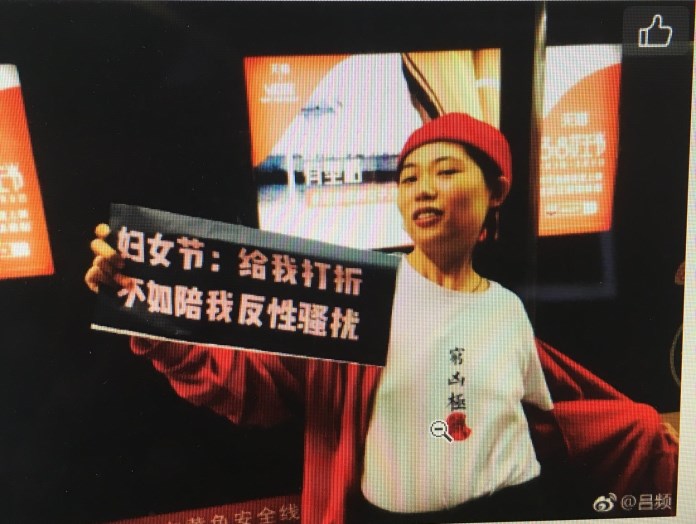A prominent Chinese feminist account was forcibly shut down on Thursday – International Women’s Day.
The Feminist Voices account on Sina Weibo, one of China’s most popular social media platforms, received a notice saying it was suspended due to “irregularities” late on Thursday evening.
Prior to its suspension, Feminist Voices had more than 180,000 followers on the microblogging platform, and was one of the most popular feminist advocacy platforms in China. It often posted articles related to feminism and rallied followers to support related causes. The account was also suspended on International Women’s Day last year, but administrators were later able to reactivate it.

The account’s founding editor Lu Pin told HKFP that their team called Weibo on Friday morning to ask about the suspension: “They said it was because we distributed sensitive content that was in violation of regulations,” Lu said.
“But they didn’t tell us exactly which content it was… and they said they could not reactivate the account for us.”
Lu added that they were appealing to Weibo to get the account back online.
Feminist Voices had launched a campaign against sexual harassment on Tuesday. It asked users to post photos and a pledge to combat sexual harassment with the hashtag #March8againstharassment. The account had been reposting the responses in the run-up to the women’s day event.
FeministVoices Weibo account (女权之声)was blocked in the evening of March 8th 2018. Today the costumer service staff of Sina told us they won’t reactive it because we “posted sensitive and illegal information”. FeministVoiceis the largest feminist alternative media in China. pic.twitter.com/kZSNrUnEIE
— 吕频Lü Pin (@pinerpiner) March 9, 2018
It also posted content criticising corporate advertisements that it said were discriminatory, and hit out at the commercialisation of women’s day, and sexist campus banners.
Large following
Lu said she did not think the topic of feminism was particularly sensitive, but its large followership may have attracted Weibo’s censors. “Our topic isn’t really related to the core of politics, but we have a big power to rally supporters… so that might be the problem, because a lot of people follow us.”
Last year, the account was suspended as administrators had posted a message about the women’s strike in the United States, but they were able to later reactivate the account, Lu said.

Prominent feminist activist Ye Haiyan posted on Weibo her reaction to the account being blocked: “I think, the Chinese government does not understand feminism, does not understand what feminists are doing, and does not understand what they are advocating. But they are prejudiced against feminists, and have not truly communicated with them.”
“People have no way to know where the boundaries of speech are, and don’t know the standards that relevant departments use to block speech. That means, regarding the control of speech, the relevant departments do not have a very clear decree. They can only go by feeling right now.”
It is unclear whether the ban on the account originated from the Chinese authorities or whether it was undertaken by censors at Sina Weibo.
Chinese authorities arrested five feminists in 2015 for their plans to commemorate International Women’s Day by handing out stickers to combat sexual harassment. Since the #MeToo movement launched last year, censors have deleted hundreds of social media posts featuring the tag “MeToo in China” and closed topic forums on the subject.
HKFP has reached out to Sina Weibo for comment.
Not-for-profit, run by journalists and completely independent. Contribute to our critical month-long HK$1m Funding Drive, help safeguard our independence and secure our operations for another year. Read how carefully we spend every cent in our Annual/Transparency Report.

